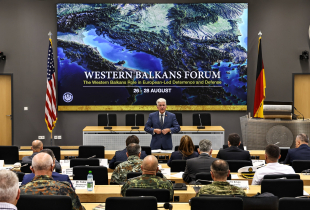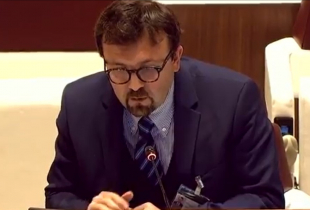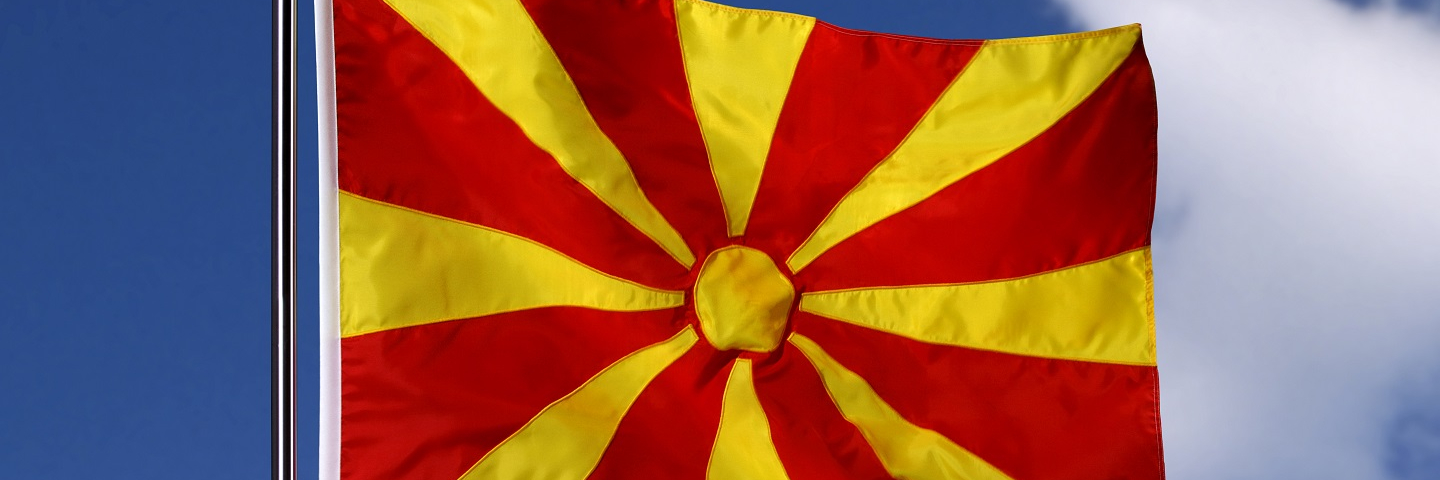
Macedonia Revisited
Introduction
In 1991, during the Yugoslav secession conflicts, Macedonia peacefully seceded from Yugoslavia, resulting in fewer headlines than the secessions of Serbia, Bosnia, Croatia or Kosovo. Since then, it seemed to be off the priority list of the transatlantic community. For almost two decades, Macedonia has rather quietly worked to gain entry into the United Nations, NATO, and the European Union, making steady gains in developing a market economy, but remaining relatively quiet on the international and transatlantic scene. Suddenly, Macedonia came to the forefront when violence broke out in the Parliament at the end of April 2017. The formation of a new government coalition caused distress, with angry young men storming the Assembly. Images of these events were televised around the globe.
One and a half year before, Macedonia shut its borders, helping to close off the Western Balkan route for the huge wave of migrants heading into Northern Europe. As a country with aspirations to join the EU and NATO, Macedonia—by closing its borders—created a paradoxical situation in which it had to defend a border vis-à-vis an EU and NATO member state Greece. While remaining in the Vienna-brokered coalition of some EU and Western Balkans states, by early 2016, the public in Macedonia was alarmed by pictures of unrest in Greek refugee camps and constant attempts by migrants to cross the border. By March, Macedonia had closed its border with Greece. Through this action, regardless of how different EU leaders and public opinion in other EU member states judged the migration, Macedonia gained geostrategic importance and found itself suddenly back on the agenda.
It is now a good time to revisit the state of play within and outside of Macedonia. It is important to answer questions about if, how, and when Macedonia should become an integral part of the transatlantic community by joining NATO and the EU. This short contribution will quickly revisit Macedonia’s recent history, map its external as well as internal challenges, and conclude with some recommendations.
Revisiting History
In 1991, Macedonia was able to secede from the Socialist Federal Republic of Yugoslavia in a peaceful manner. In the immediate aftermath, Athens and Skopje started to argue about the country’s name, state symbols, and the ancient Hellenic context. This led to a nineteen-month embargo on Macedonian products by Greece, which was dropped only after Macedonia abandoned its national symbol and agreed to UN-sponsored talks on its name.
Despite this controversy, Macedonia became a UN member in 1993 under the name “The Former Yugoslav Republic of Macedonia.” In 1995, the Republic became a member of the Council of Europe, as well as the OSCE. Due to a UN-led peacekeeping presence, Macedonia managed to stay out of any armed hostilities. The 1999 NATO Summit in Washington granted Macedonia Membership Action Plan status with the goal of joining the western military alliance. In the 1999 Kosovo conflict, Skopje’s role was widely regarded as constructive, with the country temporarily hosting fleeing Kosovar Albanians. In addition, Macedonia served as an operational platform for those NATO forces, which later turned into the KFOR mission. Macedonia also acted as security provider on the international level: it contributed troops to the ISAF engagement in Afghanistan, to UN stabilization missions like UNIFIL, and joined the armed EU presence in Bosnia and Herzegovina.
A setback can be seen in the violent outbreak of hostilities between Macedonian Albanians settling in the western part and the Slavic majority population in 2001. Dedicated EU crisis prevention activities ended the fighting, while the Ohrid Framework Agreement set up a power- sharing mechanism balancing the major Macedonian ethnic and political protagonists. The country was then assisted with a number of EU-sponsored police missions and still hosts an OSCE presence. The latter deals with the classic tasks of the OSCE baskets, as well as following up on the implementation of the Ohrid Framework Agreement, which proved functional. Brussels granted Macedonia candidate status in 2005.
What followed was a decade of torpor caused by a variety of factors, including a lack of vision by the EU about how to proceed, the continuation of the name dispute with Greece, border delimitation questions with Kosovo, the unrest in the Middle East which affected Macedonia with concerns about traveling jihadists and certainly reform fatigue in Skopje. In 2015, the European Commission noted that Macedonia was “backsliding.”
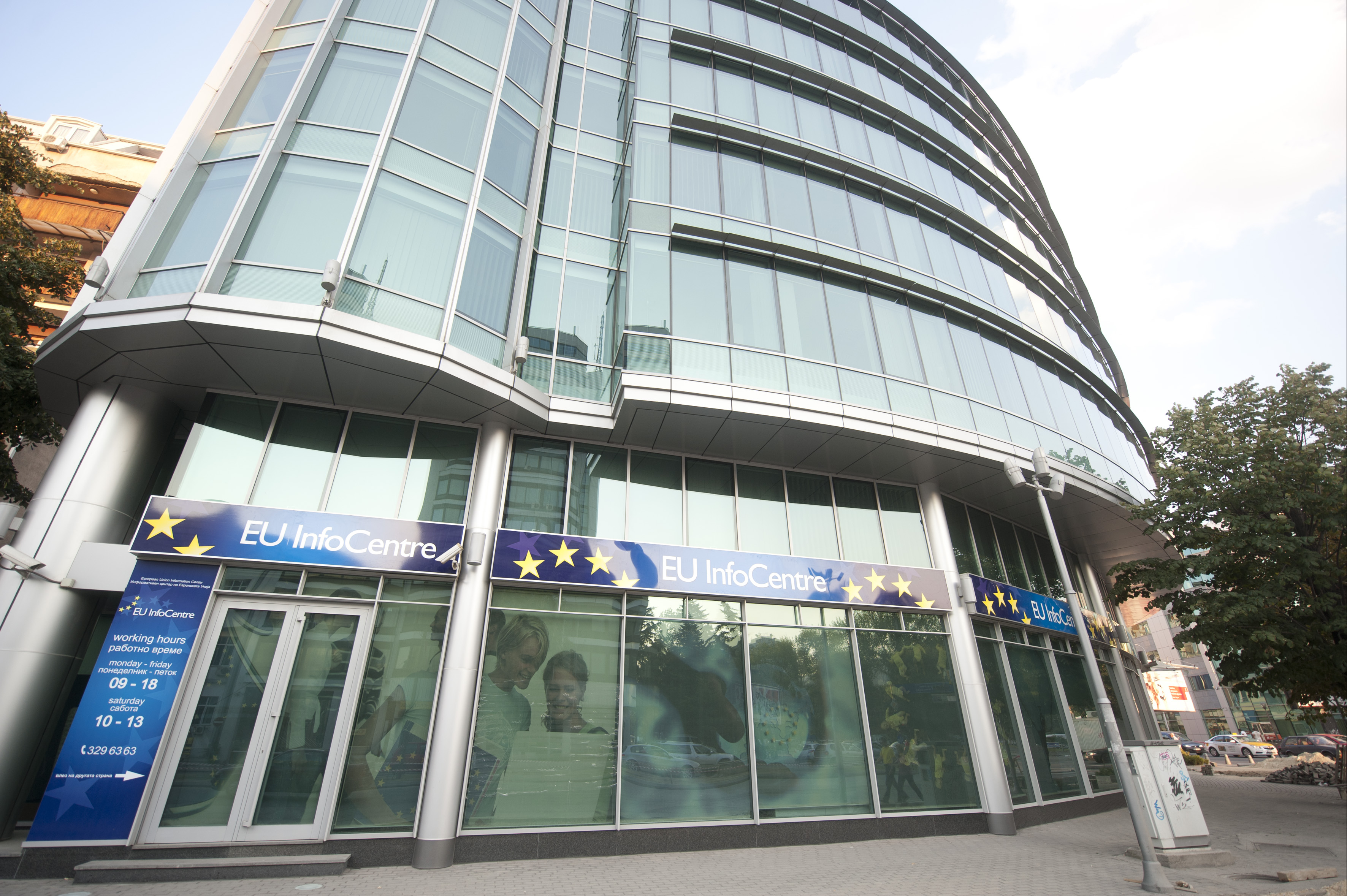
External Challenges
Let’s first turn to the external challenges. Although this issue is difficult for outsiders to understand, the name dispute between Athens and Skopje has still the potential to prevent Macedonia from joining transatlantic institutions. Greece is a member of the NATO and the EU. Thus it could veto a membership for both organizations. For instance, at the Bucharest Summit in 2008, NATO stressed its readiness to accept Macedonia as a full-fledged member, but required first settlement of the name dispute. This resulted in a case brought before the International Court of Justice. The Hague later ruled that Greece had violated Public International Law by vetoing Macedonia’s bid to join the alliance. Some scholars have asked to combine the European efforts to solve the Greek financial crisis with a more cooperative attitude by Athens towards the name issue. However, the two issues were kept separate. This enabled populist forces on both sides to stir up the emotions whenever needed to advance a local agenda. It is nevertheless noteworthy that Greece and Macedonia have managed to enter into good neighborly relations on all technical matters. There is a vibrant economic relationship between both countries, freedom of movement for citizens, and the corridor to Thessalonica harbor is open, something which is vital for Macedonian exports. This positive trend is supported by bilateral ministerial meetings and growing interaction of public institutions on the working level.
In parallel, the Kremlin’s efforts to revive pan-Slavic sentiments in the Balkans did not remain unnoticed by the international community. Writ large, those initiatives aim to dissuade South East European (SEE) states from their transatlantic aspirations by referring to historical orthodox and Slavic brotherhood ties. The efforts were diplomatic as well as partly economic and security- related. The case of a small semi-military presence in Serbia underlines Moscow’s desire to keep a foot in the door. Overall, the rhetoric does not differ from Russia’s creativity in other regions; the aim is mainly to discredit the West and its institutions.
Besides Greece in the south, Macedonia borders Bulgaria in the west, Kosovo in the east, Serbia in the north, and the Republic of Albania in the south-west. Of particular interest are the relations with Serbia and Kosovo, mostly because of the volatile relationship between these two states. Occasionally, extremist voices in the region calling for a grand redesign in the Western Balkans engender alarm. Suggestions range from territorial exchanges between Serbia and Kosovo up to the creation of new homogenously ethnic states. These visions would threaten South East European states such as Bosnia and Herzegovina, as well as the Republic of Macedonia in its present existence. Thus, they are widely rejected by the international community. In sum, the relationship with Kosovo is characterized by a trend toward normalization with occasional disturbances. While it is apparent that freedom of movement has to be maintained for inner- Albanian economic, cultural, academic, and family ties, Pristina is aware that it depends on Macedonia as a transit country for its own export to Greece and beyond. Unfortunately, not all cross border activities are legal. Notwithstanding the huge loss of tax revenue, preventing trafficking and smuggling should be of joint interest for the Republic of Macedonia as well as Kosovo. In this light, Macedonia promised to boost its efforts against trafficking of small arms, counterfeit goods, and human beings.
All of the Balkan countries have recently begun to face the challenges of traveling jihadists and foreign fighters. A growing number of Muslim individuals or converts joined the so-called Islamic State (IS) to fight in Iraq or Syria. More than a hundred fighters are believed to be of Macedonian origin, approximately twenty-five of whom have allegedly already lost their lives. Those who return home are perceived to be a threat to public order and security. In consequence, Skopje amended the country’s Criminal Code, introducing a sentence for joining violent associations abroad. Additionally, the government now offers a mix of repressive, preventive, incentivizing, and reintegrating instruments to cope with returnees from Syria or Iraq. A new National Strategy to Combat Terrorism and a related Action Plan were also introduced.
Recently, radicalized individuals from the Middle East started to use the Balkan route with the eventual intention of launching attacks in Central Europe. One example of this became known after the investigations into the November 2015 Paris attacks revealed that a cell managed to hide in the larger migration flow with the aim of reaching France. In consequence, Skopje and its allied capitals in the region placed great emphasis on the contested link between migration and security. Macedonia remained firm in the Vienna/Visegrad Group-backed closure of the Balkan route.
Outside the security dimension, Macedonia faced quite a logistical challenge when it became a gateway for migrants and refugees to Central and Northern Europe. In fall 2015, authorities estimated that up to 10,000 individuals crossed the border per day. In sum, more than a million persons used Macedonia as transit country before entering Serbian territory near Kumanovo. While channeling the flow northwards, the respective local agencies managed to provide humanitarian assistance and register a large number of persons. Until Macedonia mobilized its Armed Forces to close and protect its border, no major incidents became known.
In conclusion, Macedonia finds itself in a topical and regional context that seems uneasy. While there are signs of normalization in this part of the Western Balkans, there is still room for improvement. Dedicated efforts are needed to improve the regional infrastructure, expand judicial and law enforcement cooperation, and enhance the volume of trade in and around Macedonia.
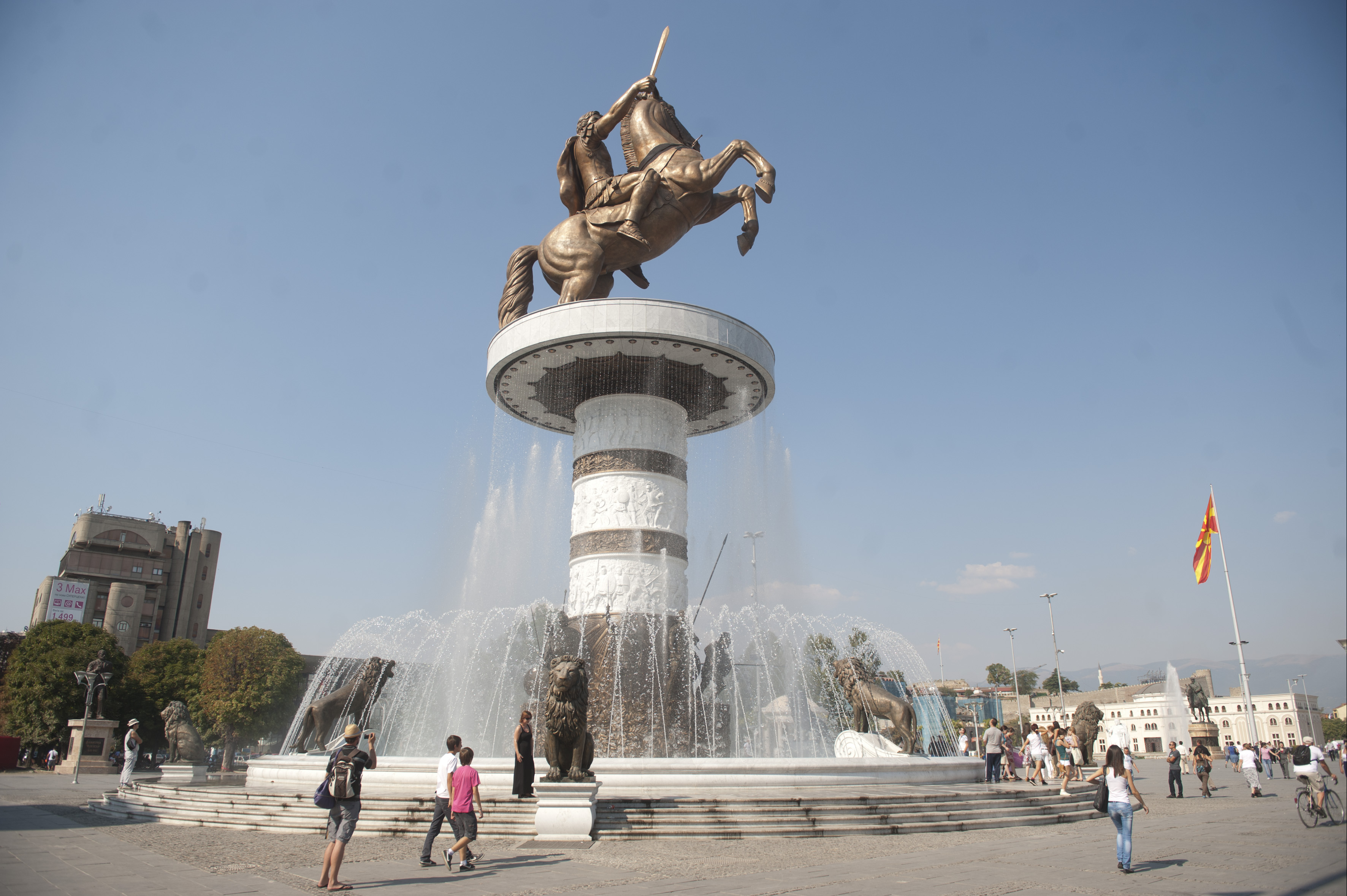
Internal Challenges
What are the domestic challenges? It is clear that the Ohrid Agreement calmed the ambiguous relationship between Albanian and Slavic citizens of Macedonia. Ever since 2001, institutions in have been working on matters including language, decentralization, and equal representation ratios. The most visible was the establishment of the South East European University, also known as the van der Stoel University in Tetovo, offering higher education in both languages, plus English. Unfortunately, overall reconciliation is sometimes torpedoed by armed incidents with casualties. Although they may look like ethnically-motivated violence, some evidence also suggests that these attacks could be related to organized crime.
The last elections resulted in a virtual draw between the Social Democrats and the Internal Macedonian Revolutionary Organization/Democratic Party for Macedonian National Unity. Prior to the elections, Macedonia’s Head of State, Gruevski, resigned in early 2016. After two attempts to hold free and fair elections, citizens cast their ballots again in December last year. The OSCE didn’t criticize the elections, but the close results prevented the quick formation of a new government. In accordance with the Ohrid Agreement, the prevailing party must form a coalition with a junior partner from one of the two major Albanian-dominated parties. Hence, it is up to the major political protagonists from all communities to agree on a functioning coalition. The recent turnout might be interpreted as a schism within the Slavic population, however, a more detached look may also suggest that Macedonian voters refused hegemonic rule by any of the political landscape’s protagonists. Additionally, the turnout—of around 67 %—is a remarkably high figure in relation to voter turnouts in neighboring Balkan states.
For the average Macedonian citizens, issues of daily life may be of greater concern. Currently, the unemployment rate of around 28 % is still worrisome. The recent Human Development Index ranks Macedonia at 81. The current World Justice Project’s Rule of Law and Corruption indices rank Skopje at 54 and 64. For a European country, this can be considered modest at best. Or, as the European Commission noted at the end of 2015:
This backsliding refers to Macedonia’s internal turmoil in 2015 and 2016, during which political turbulence even impacted the country’s productivity. While the economy grew 3.7% in 2015, and thus exceeding the growth rates of most EU member states, it shrunk to 2.2 % in 2016. This figure is alarming since Macedonia needs to lower (and ultimately abandon) its current tolls if it wishes to join the EU. Prognoses say that a growth rate of up to 7% would be desirable to catch up with Western European standards. Currently, the average Macedonian’s income (roughly €350 per month) is only about one-third of the income of the average EU citizen.
In turn, the Macedonian government has recently introduced various packages to improve the economy. Amongst them are action plans and strategies to attract more foreign direct investment (FDI) with the intent of increasing the competitiveness of local products, supporting innovation, and improving the business climate at large. With these goals in mind, the government in Skopje sought dialogue with the business community and implemented a number of ideas formulated in cooperation with Macedonia’s private sector. This resulted inter alia in initiatives to link domestic companies with foreign direct investors in order to improve business liquidity and access to finance, to improve related education schemes, and to foster public-private dialogue. However, a key stumbling block remains. Like the surrounding South Eastern European states, Macedonia has not yet achieved a level of transparency that encourages more foreign direct investment. Who shall invest when former legacies continue and the overall performance appears immature? In consequence, the Macedonian import/export figures remain unbalanced. The country imports goods worth around €5.7 billion but only exports goods worth approximately €4 billion.
In its key findings, a 2015 report by the European Commission’s summarizes:
Skopje’s elite, it seems, must have understood the message. The Law on Corruption was amended. The State Commission for Prevention of Corruption needs to prove that it is able to tackle the related illicit activities. Almost in parallel, the Action Plan on Prevention and Repression of Corruption and Prevention of Conflict of Interest was drafted. These initiatives need to go hand in hand with similar efforts to reform the judiciary, as Macedonia’s citizens still lack trust in this branch of government. The government has promised to introduce judicial reforms and boost transparency; it has also declared its clear intention to equip courts with well- educated staff. This is of utmost importance since the European Commission criticized Macedonia for potential political interference in the work of the judiciary. It asked Skopje to depoliticize the appointment and promotion systems in practice, not only in law; provide full support and resources to the special prosecutor; reform the existing discipline and dismissal system for judges; adopt a new judicial reform strategy and action plan addressing remaining shortcomings in a sustainable manner; and improve strategic planning, needs assessment, resource management and allocation within the judiciary.
Recommendations
The To-Do list for the Macedonians remains long. Skopje should not expect a reward for its role in the Vienna-brokered closure of the Balkan route, notwithstanding how Macedonia’s role in the migration crisis is viewed now and in the future. Creating transparency, fostering rule of law, fighting corruption, and tackling organized criminal networks remain key challenges. The West will continue to offer assistance. But Skopje will need to take more ownership in the process if it wishes to become part of a community of values and mutual trust.
All parties need to overcome the name issue. It might be noteworthy to involve the Macedonian Albanian community into the process. They are less emotional about the Hellenic context and the entire ancient heritage discussion causing this stalemate. In addition, the general Western- minded attitude of all Albanian communities in South East Europe may make them ideal facilitators, thus eventually allowing all parties to bridge antique sentiments and modern policy.
This leads to the question of regional cooperation. As mentioned above, the states within the former Yugoslav space are not yet wholly at ease with one another. Promising signals do exist, however, and Macedonia–along with its neighbors–contributes to various regional initiatives. These range from a number of bilateral agreements, to the general participation in the South East European Cooperation Process (SEECP) based in Sarajevo, to the secondment of law enforcement personal to a regional crime-fighting center residing in Bucharest. Nevertheless, the current cross-border initiatives do not yet rival the political, economic, and judicial climate between the Scandinavian, Baltic, or BENELUX-states. While urging regional cooperation should remain high on the EU’s and NATO’s agenda, additional efforts must also originate in Balkan capitals. The Berlin-initiated Western Balkan 6 process (WB6) process points in this direction. This informal working group also addresses trans-regional infrastructural issues such as highways and electricity. Skopje is well advised to continue its constructive approach within this network.
Macedonia is certainly not to be blamed for the general European fatigue to face another enlargement round. Brussels seems to be still digesting the Eastern enlargement of 2007, when Romania and Bulgaria joined the Union. Soon after membership was granted, critics argued that European rule of law standards were not met, that the fight against corruption and organized crime was half-hearted and that migrating individuals would abuse western welfare systems. These arguments are still used by populist movements and became even part of the UK’s pro- Brexit campaign. As a consequence, it was argued that the European Four Freedoms need to be revised. Eventually, full membership might be thinkable with a reshaped and balanced approach to the Freedoms, but this question would be on the EU’s homework list rather than Macedonia’s. A potential way ahead is to copy Croatia’s accession process. In retrospect, it seems that Croatia’s path towards the EU was more carefully handled. It did not, in any case, cause a massive tide of citizens seeking welfare services abroad. The Croatian economic figures give reason for optimism. The current government rather is composed of post-war reform-minded talent. Therefore, the narrative to counter critical voices of enlargement inside the EU, is to stress that Brussels and the member states have learned since 2007 how to carefully integrate an SEE country into the European Union.
One may conclude that Macedonia’s record is mixed, however, it is not correct to label the country a “rogue state,” as some liberal-minded Central Europe-based editorials have suggested. This would overlook the region’s difficult past and ignore a number of courageous and harsh reforms initiated by Macedonia. Skopje may not be ready to join the key transatlantic institutions immediately, but all parties need to consider the next steps carefully. First of all, it is up to Macedonian voters to determine in an eventual new round of elections who shall lead the country into a more prosperous future. Secondly, more honesty and transparency by the local and regional players would help Macedonia’s cause, making it easier for all the negotiating parties. An open interaction would be necessary to communicate tasks as well as progress to all parties.
In sum, the government in Skopje and the Brussels-based institutions face challenges and opportunities at the same time. The momentum is on Skopje’s side, as is its geostrategic relevance, as long as the migration crisis is on-going. Nevertheless, on the internal front, the country needs to quickly form a government. Macedonian decision-makers and citizens should continue to repeat their plea to the West, “We want to join!” The response should be “You are and will be part of us!” But this reassurance should be accompanied by “As long as you implement reforms!”
For Academic Citation
Bekim Maksuti and Sebastian von Münchow, “Macedonia Revisited,” Marshall Center Security Insight, no. 19, May 2017, https://www.marshallcenter.org/en/publications/security-insights/macedonia-revisited-0.
About the Authors
Dr. Bekim Maksuti has been serving as the Deputy Minister of Defense of the Republic of Macedonia since April 2016. He is also a lecturer at the South East European University in Tetovo and the Military Academy “General Mihailo Apostooski” in Skopje where he previously studied. He has completed his Masters and PhD at the Institute for Security, Defense, and Peace Studies. During his service in the armed forces, Dr. Maksuti was deployed twice to Operation Iraqi Freedom. He has worked for the Ministry of Defense as a Director for International Relations and Chief of Cabinet to the Minister of Defense. He was a part of Macedonia’s delegation to the NATO Summits in Chicago 2012 and Wales 2014.
Dr. Sebastian von Münchow is a lecturer at the George C. Marshall European Center for Security Studies. He studied law and political sciences in Germany, Switzerland, and Austria. After receiving his Masters of Law, he became a member of the Berlin bar. He then earned his doctorate in international relations at the University of Vienna, after which Dr. von Münchow worked for field missions of the Organization for Security and Co-operation in Europe and the European Union in the Balkans. In Brussels, he joined the Office of the Special Coordinator of the Stability Pact for South Eastern Europe. After returning to Germany, Dr. von Münchow worked for several years in the Federal Chancellery.
The Marshall Center Security Insights
The George C. Marshall European Center for Security Studies in Garmisch-Partenkirchen, Germany, a German-American partnership, is committed to creating and enhancing worldwide networks to address global and regional security challenges. The Marshall Center offers fifteen resident programs designed to promote peaceful, whole of government approaches to address today’s most pressing security challenges. Since its creation in 1992, the Marshall Center’s alumni network has grown to include over 13,715 professionals from 155 countries. More information on the Marshall Center can be found online at www.marshallcenter.org.
The articles in the Security Insights series reflect the views of the authors and are not necessarily the official policy of the United States, Germany, or any other governments.
